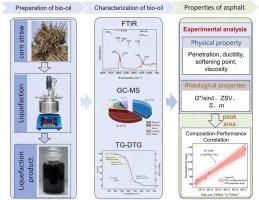Green utilization of corn straw: Prediction of bio-oil liquefaction yield and application of bio-oil in asphalt
IF 5.6
1区 农林科学
Q1 AGRICULTURAL ENGINEERING
引用次数: 0
Abstract
To achieve the sustainable and eco-friendly development of pavement materials, finding alternative materials to reduce the dependence on petroleum resources is desirable. In this study, bio-asphalt was prepared using liquefied products derived from corn straw. Firstly, the effects of liquefaction parameters on the liquefaction yield of straw bio-oil were explored, and a bio-oil liquefaction rate prediction model was constructed by combining the machine learning algorithm. Then, the composition of the bio-oil was characterized using Fourier transform infrared spectroscopy (FTIR) and gas chromatography-mass spectrometry (GC-MS), while its thermal stability was analyzed through thermogravimetric analysis (TGA). Finally, the mechanism by which bio-oil influences both the conventional and rheological characteristics of bio-asphalt was examined. The results indicated that the liquid-solid ratio (LR) during the liquefaction process has the most significant impact on the bio-oil liquefaction yield of corn straw. Constructed corn straw bio-oil liquefaction yield model can predict the liquefaction accurately under various parameters, and the relative error of prediction is less than 5.51 %. The composition of bio-oil includes phenols, esters, and other components with high stability. It can maintain good thermal stability from 0℃ to 200℃, and its chemical composition resembles that of asphalt. The asphalt still retains its inherent properties with a 25 % bio-oil content, and the bio-asphalt exhibits good performance at both high and low temperatures. Moreover, the alcohols present in bio-oil significantly impact the consistency of asphalt, while esters are positively correlated with the asphalt’s performance at high temperatures.

玉米秸秆的绿色利用:生物油液化产量预测和生物油在沥青中的应用
为了实现路面材料的可持续和环保发展,寻找替代材料以减少对石油资源的依赖是可取的。本研究以玉米秸秆液化产物为原料制备生物沥青。首先,探讨了液化参数对秸秆生物油液化率的影响,并结合机器学习算法构建了生物油液化率预测模型。然后,利用傅里叶红外光谱(FTIR)和气相色谱-质谱(GC-MS)对生物油的组成进行了表征,并通过热重分析(TGA)对其热稳定性进行了分析。最后,探讨了生物油对生物沥青常规特性和流变特性的影响机理。结果表明,液化过程中的液固比对玉米秸秆生物油液化率的影响最为显著。所构建的玉米秸秆生物油液化产率模型能准确预测各种参数下的液化,预测的相对误差小于5.51 %。生物油的成分包括酚类、酯类等,具有较高的稳定性。在0℃~ 200℃范围内保持良好的热稳定性,化学成分与沥青相似。当生物油含量为25% %时,沥青仍保持原有的性能,并且在高温和低温下均表现出良好的性能。此外,生物油中的醇类对沥青的稠度有显著影响,而酯类与沥青的高温性能呈正相关。
本文章由计算机程序翻译,如有差异,请以英文原文为准。
求助全文
约1分钟内获得全文
求助全文
来源期刊

Industrial Crops and Products
农林科学-农业工程
CiteScore
9.50
自引率
8.50%
发文量
1518
审稿时长
43 days
期刊介绍:
Industrial Crops and Products is an International Journal publishing academic and industrial research on industrial (defined as non-food/non-feed) crops and products. Papers concern both crop-oriented and bio-based materials from crops-oriented research, and should be of interest to an international audience, hypothesis driven, and where comparisons are made statistics performed.
 求助内容:
求助内容: 应助结果提醒方式:
应助结果提醒方式:


